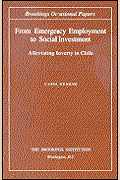Studies in this week’s Hutchins Roundup find that technological advances do not decrease overall employment levels, weak investment is cyclical in Europe but structural in the US, and more.
Want to receive the Hutchins Roundup as an email? Sign up here to get it in your inbox every Thursday.
Technological advances favor skilled workers but do not threaten overall employment levels
Using over 35 years of country and industry level data for 19 countries, David Autor of MIT and Anna Salomons of Utrecht University conclude that productivity growth does not threaten overall employment. Although employment shrinks in industries with rising labor productivity (like manufacturing), other sectors of the economy (mostly the service sector) absorb these workers so that overall employment increases slightly, they find. However, the reallocation of workers across industries does lead to changes in the demand for different types of workers. In particular, they find that rapid productivity growth has favored high- and low-skill workers at the expense of middle-skill workers.
Europe and the US have low investment, but for different reasons
Investment has decreased in Europe and the U.S., but there is little agreement about the cause and the permanence of the drop. The University of Amsterdam’s Robin Döttling and New York University’s Germán Gutiérrez and Thomas Philippon find that weak investment in Europe is explained by depressed asset values, consistent with financial constraints, high risk premia, low expected demand, and low expected cash flows. In contrast, they find that U.S. investment is depressed because industries have become more concentrated over time, reducing competitive pressures to invest. Because European causes are more cyclical and U.S. causes more structural, investment is more likely to rebound in Europe than in the U.S., they claim.
Self-employment among older workers acts as transition toward retirement
Analyzing a panel of administrative tax data and the Health and Retirement Study, Shanthi Ramnath of the Department of the Treasury, John Shoven of Stanford, and Sita Slavov of George Mason find that Social Security receipt increases the probability of transitioning from wage-employment to self-employment, particularly for those with greater retirement wealth. However, individuals who transition from work to self-employment in their 60s have a much larger drop in earnings than those who transition at younger ages, they find, and income earned from self-employment at older ages is relatively low. The authors conclude that the transition to self-employment allows workers to gradually reduce hours and earnings along the pathway to retirement, but does not materially increase retirement security.
Chart of the week: The 2.3 million people at the top 1 percent of the income distribution earn on average $1.3 million per year
Quote of the week: “Some would say that the ECB is a villain who picks savers’ pockets, who redistributes risk and wealth. Others would say that the ECB is a reluctant hero: when others fail, it reluctantly steps in and saves the world – or at least the euro area. In my view, the ECB plays neither of these two roles. In fact, the ECB is allowed to play one role only, and that role is clearly defined. The ECB has to safeguard price stability,” says ECB Executive Board Member Sabine Lautenschläger.
“To be more precise: in the medium term, inflation should be below, but close to, 2%…That is important, but it is not enough for a leading role. That part is for others to play. And those others are to be found in the field of politics. I am referring to the national parliaments and governments in the euro area and to the European Union’s institutions – the Commission, the Council and the European Parliament. They are the main characters… Only they can take the story of the euro area forward in a way that is beneficial for all. It is only they who can bring about the much-needed reforms, and it is only they who have the democratic mandate to do so.”
The Brookings Institution is committed to quality, independence, and impact.
We are supported by a diverse array of funders. In line with our values and policies, each Brookings publication represents the sole views of its author(s).









Commentary
Hutchins Roundup: Technological advancements and job losses, low European and US investment, and more
Thursday, July 6, 2017